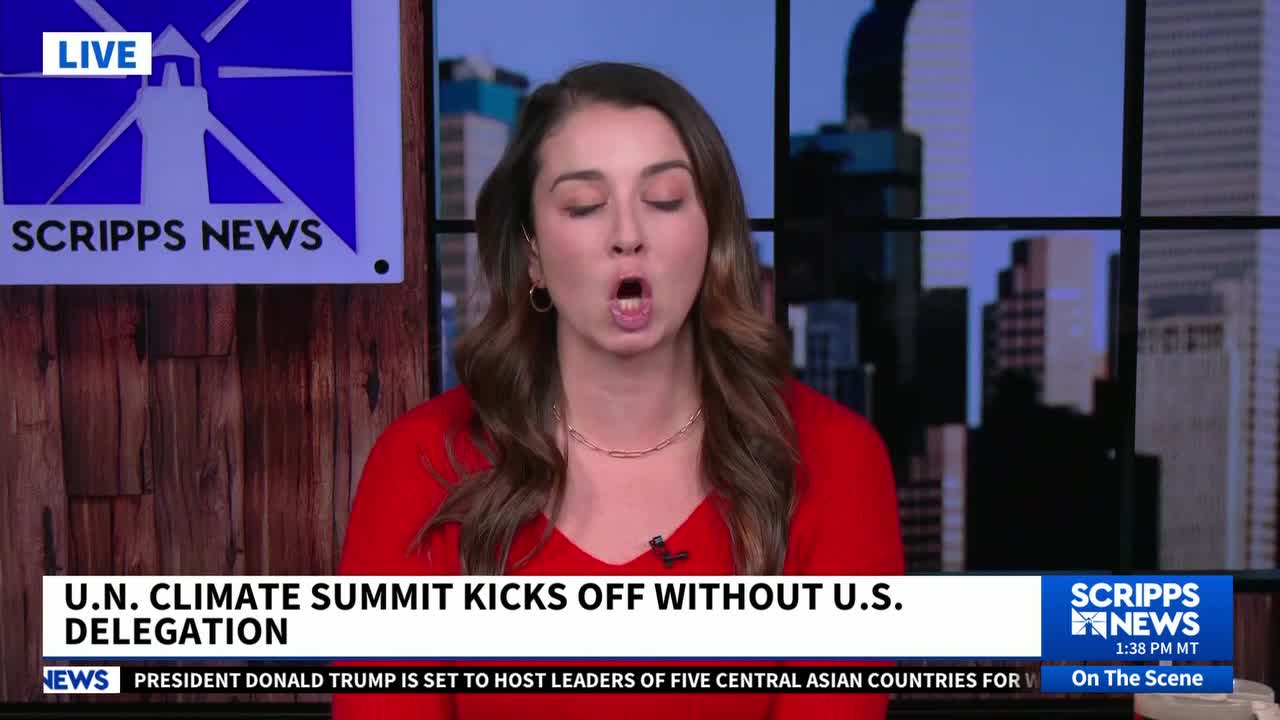A pivotal United Nations Climate Summit is beginning to take shape in Belem, Brazil as world leaders arrive for this year’s Conference of Parties – known as COP30 – notably without a United States delegation in attendance.
Climate advocates worry this move threatens to “derail” momentum behind new emissions and financing commitments, especially as China tapped its deputy prime minister to attend over high-level representatives, raising concerns over whether the world’s two largest emitters will shape any actionable outcome.
Thursday kicks off a gathering of heads of state over the next two days; the leaders of China, the U.S. and India all absent before the formal U.N. climate talks begin next week.
The United States’ empty chair prompted activists to fill the void; hundreds of representatives from organizations like Greenpeace and the Center for Biological Diversity are on the ground instead.
Jean Su, the energy justice director of the Center, wrote to Scripps News in an email that their presence is essential to convince international leaders that “they should not allow a bully like Trump to derail decades of negotiations” and that the activists are there “to represent the majority who care passionately about having clean air, clean water and a safe climate future.”
“Trump’s stance affects the whole global balance. It pushes governments further toward denial and deregulation,” said Nadino Kalapucha, the spokesperson for the Amazonian Kichwa Indigenous group in Ecuador. “That trickles down to us, to Ecuador, Peru, Argentina, where environmental protection is already under pressure.”
The host city of Belem exemplifies the stakes of the global summit on climate action; as leaders and attendees fly in, they’ll likely see barren plains surrounding the coastal city, dotting the green carpet and winding rivers. Around seventeen percent of the Amazon’s forest cover has vanished in the past 50 years, swallowed up for farmland, logging, and mining.
Known as the “lungs of the world” for its capacity to absorb vast quantities of carbon dioxide, a greenhouse gas that warms the planet, the biodiverse Amazon rainforest has been choked by wildfires and cleared by cattle ranching.
It is here on the edge of the world’s largest remaining rainforest that Brazil's President Luiz Inácio Lula da Silva hopes to convince world powers to mobilize enough funds to halt the ongoing destruction of climate-stabilizing tropical rainforests in danger around the world and make progress on other critical climate goals.
RELATED STORY | World already seeing more dangerous heat days — and it’s just the beginning, study says
Large-scale marches, sit-ins and rallies are essential aspects of annual U.N. climate talks, but the previous three summits have taken place in autocratic nations that outlaw most forms of protest. Egypt, the United Arab Emirates and Azerbaijan complied with U.N. rules that facilitate pre-approved protests within a walled-off part of the venue not subject to local laws.
Brazil is a different story. As world leaders arrived Thursday for the summit, environmental advocates were reveling in their much-missed freedom. Youth activists, Indigenous leaders and climate campaigners banged drums outside the sprawling convention center where main debates will be held and sailed into Belem on vessels outfitted with giant protest banners.
The debate and negotiations come under the shadow of a recently released and controversial memo by Bill Gates, who has long advocated for innovation in clean energy and climate solutions, published in the lead up to the summit. In it, he called for a “strategic pivot" in how the world approaches climate change, and that while it is a serious threat, “it will not lead to humanity’s demise.” He argues for shifting towards improvements to human welfare, to prevent suffering for those in the toughest conditions in the world’s poorest countries.
That framing has drawn sharp criticism from climate scientists who say it creates a false choice between fighting climate change and fighting poverty.
“That mental model is fundamentally flawed because climate change is not a separate bucket,” Katherine Hayhoe, the Chief Scientist for the Nature Conservancy and a professor at Texas Tech University said at a press conference hosted by Climate Now following the memo’s release. “The reason we care about climate change is because it affects everything else we already care about. Our health, our welfare, our wellbeing, poverty, hunger, disease, and the economy, national security, you name it. So climate is rather the hole in every other bucket.”
“We don’t necessarily live in a zero sum world,” said Zeke Hausfather, a climatologist and energy systems analyst. “It’s fundamentally a policy problem, not a resource problem. I think in cases where there is money going to the poorest countries today for mitigation, maybe more of that should go to adaptation. Maybe more of that should go to disease eradication. But that's not the fundamental thing that's standing in the way of solving climate change. The fundamental thing is emissions, and that's mostly coming from the rich countries today.”
Scientists and climate advocates ultimately warn that without U.S. leadership at the table, it will be harder for negotiators to push forward new commitments before warming crosses dangerous thresholds.
RELATED STORY | International Court says countries must address climate crisis in landmark opinion





